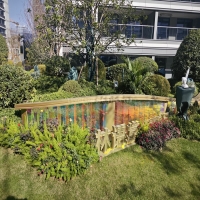Welcome to the website for landscape facilities products and knowledge.
What are the energy efficiency considerations for landscape bar counters with built-in lighting or appliances?
When designing outdoor entertainment spaces, landscape bar counters with integrated lighting and appliances have become increasingly popular. However, their energy consumption can significantly impact both environmental sustainability and operational costs. Implementing proper energy efficiency considerations ensures these features enhance outdoor living without creating excessive energy burdens.
The lighting components represent a primary energy consideration in landscape bar counters. LED technology has revolutionized outdoor lighting efficiency, consuming up to 75% less energy than traditional halogen or incandescent options. For landscape bars, choose integrated LED strips specifically rated for outdoor use (IP65 or higher) with color temperature options between 2700K-3000K for both ambiance and functionality. Solar-powered LED options provide excellent efficiency for bars receiving adequate sunlight, while motion sensors and dimmers can reduce unnecessary energy consumption during periods of non-use.
Built-in appliances present another significant energy consideration. Outdoor refrigerators, ice makers, and beverage coolers must be specifically designed for exterior use while maintaining energy efficiency. Look for units with ENERGY STAR certification, which typically consume 15-20% less energy than non-certified models. Insulation quality is particularly crucial for outdoor appliances, as they must maintain temperature despite fluctuating ambient conditions. Consider positioning appliances in shaded areas of the bar counter to reduce the cooling workload during hot days.
The integration of smart technology offers substantial energy savings potential. Programmable timers for both lighting and appliances can align operation with actual usage patterns, preventing energy waste during unoccupied hours. Smart plugs and energy monitoring systems provide real-time consumption data, allowing for adjustments to maximize efficiency. For permanent installations, hardwired systems typically offer better energy efficiency than plug-in alternatives when properly installed by licensed electricians.
Material selection and construction methods indirectly impact energy efficiency. Thermal-resistant materials for counter construction help maintain appliance efficiency, while strategic orientation of the bar counter can maximize natural shading and reduce cooling demands. Incorporating renewable energy sources, such as connecting to solar panels or using low-voltage systems, can further enhance the sustainability of outdoor bar installations.
Proper weatherproofing and maintenance contribute significantly to long-term energy efficiency. Ensure all electrical components have appropriate weather ratings and are regularly inspected for damage that might compromise efficiency. Keep appliance coils clean and ensure door seals remain tight to prevent energy waste. For lighting, regularly clean fixtures and replace any failing components promptly to maintain optimal performance.
By implementing these energy efficiency considerations, homeowners and designers can create beautiful, functional landscape bar counters that minimize environmental impact while providing exceptional outdoor entertainment experiences. The initial investment in efficient technology typically yields long-term savings through reduced energy consumption and extended equipment lifespan.
Related search:

Recommendation
Metal and acrylic color-changing combined curtain wall for large-scale public landscape facilities